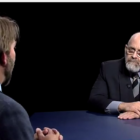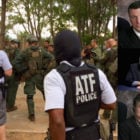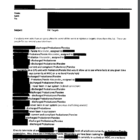Criminal Justice
Defense lawyer blasts feds for secret response to racial profiling claims
|
The secret filing means the public cannot view — or scrutinize — the U.S. Attorney’s defense of Yusef Casanova’s arrest, which federal public defender Brian Pori has challenged. Last month Pori argued in a motion that he had enough evidence to prove ATF agents and informants targeted Casanova because he’s black and asked Senior U.S. District Judge James Parker to drop methamphetamine trafficking and illegal firearm possession charges.
In a filing Wednesday afternoon prosecutors noted their reason for responding to Pori’s original motion under seal, writing it “identifies by name a number of uncharged subjects of the (operation) and references the content of other sealed filings.”
But Pori told NMID the government did not need to name people who had been identified for investigation but not arrested. Prosecutors could’ve blacked the names out of the document, but left its defense of Casanova’s arrest for the public to see, he noted.








